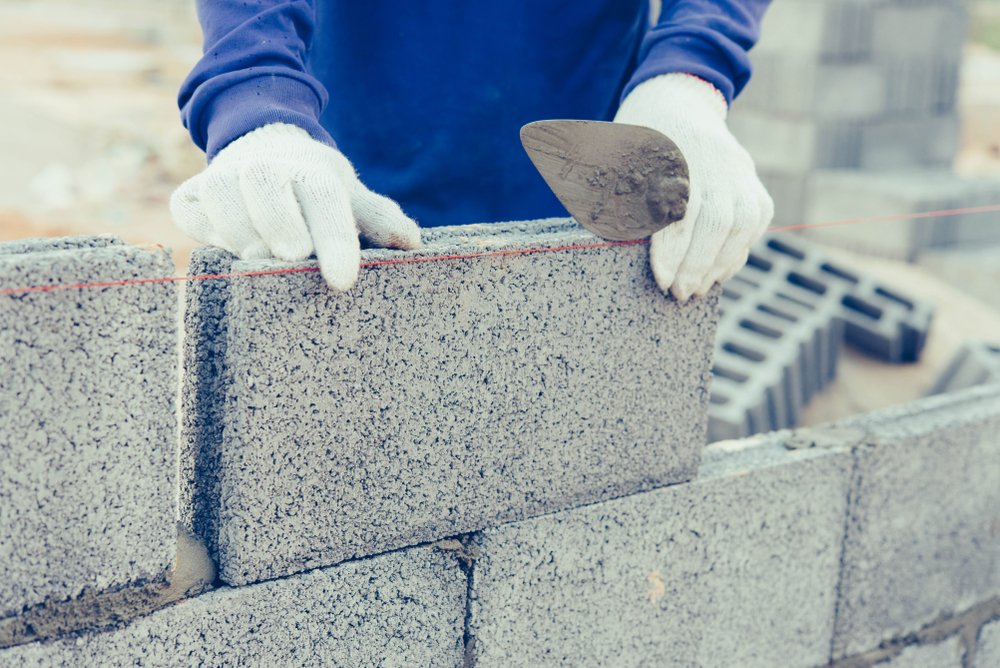- How to decide which material to use based on insulation value, strength, cost, and weight
- How bricks and concrete blocks are made
- Why you should call the Brick Experts to build a screening wall for your Dallas-Fort Worth home
Insulation Value
A material’s ability to insulate is measured using a metric called R-value. The higher the R-value, the more effective the material is at insulating. A typical brick wall has an R-value of 0.2 per square inch. As most bricks are similar, there tend not to be many variations in their R-value. On the other hand, a wall made of 8-inch concrete blocks has an R-value of 0.08 per square inch. Insulated concrete blocks, though, may have R-values that reach as high as 1.2 per square inch. Air-entrained blocks can shoot even higher, with an R-value of 3.9 per square inch.Strength
Generally, all concrete blocks must withstand the pressure of at least 1900 pounds per square inch. However, many concrete blocks are stronger than this, with the average hovering somewhere near 3500 PSI. Clay bricks have a listed strength that averages out to 3000 psi. Of course, with bricks, you’ll also need to use mortar that has its measured strength. Mortar with a high cement content can withstand up to 2500 PSI. Mortars high in lime, though, are much weaker and often have maximum PSIs of only 350.Cost
According to Home Advisor, the cost of a single brick or concrete block tends to be similar on the low-end. However, on the high-end, bricks can be much more expensive, especially when you consider the cost of labor. Nationally, brick screening walls can cost between $10 and $45 per square foot. Concrete screening walls average between $5 and $12 per square foot, with that price doubling once you include veneers.Weight
Again, both materials are strong and durable. While size plays a role, though, clay brick is much lighter than an 8-inch concrete block. The former weighs around 5 pounds, while the latter can weigh more than 40 pounds. However, there is also autoclave aerated concrete, which is considered a lightweight block. These contain up to 80% air and weigh around 8 pounds per 8-inch block.Which is Better: Concrete Blocks or Bricks?
It’s difficult to say whether concrete blocks or bricks are better. Based on the info above, some may prefer the lightweight yet durable nature of brick. Others may prefer concrete due to its typically lower cost or because it won’t retain as much heat during the hot summer months. Your design aesthetic also plays a role, as many feel brick offers a homier feel while concrete can seem utilitarian.What is the Difference Between Concrete and Brick?
The main difference between concrete and brick is the materials used to make them. Bricks are often made from various clays, including surface clays, fire clays, and shales. Concrete blocks, however, are made from a mixture of cement, lime, and aggregates (rocks).What is a Concrete Screening Wall?
While brick screening walls tend to be made the same way, concrete screening walls can be constructed through a variety of methods:- Concrete block: This method is similar to bricklaying. Concrete blocks are placed next to and on top of each other, with layers of mortar in-between holding them in place.
- Poured in place: This method involves pouring concrete between two mobile walls that hold it until it dries. With fewer joints, poured concrete walls are usually stronger and easier to waterproof than concrete blocks.
- Pre-cast: Concrete walls are molded, formed, and cured in a controlled environment, then transported and installed.
Call The Brick Experts Today
If you’re looking to build a brick or concrete screening wall in your Dallas-Fort Worth yard or home, call The Brick Experts today! Our team of skilled and experienced masons can walk you through all the options and ensure that your new wall complies with any applicable code, law, or regulation.Give us a call today for a free quote at 817-901-0236
View Our LocationsFeatured Image: TAKAZAWA/Shutterstock










